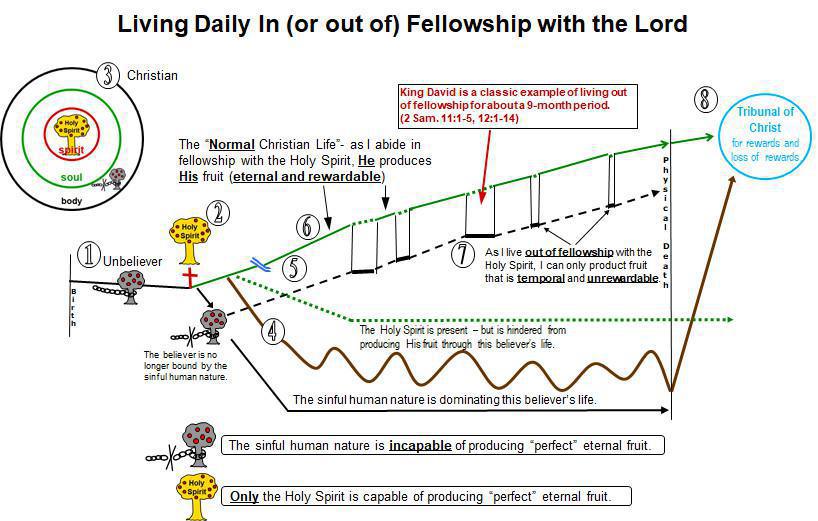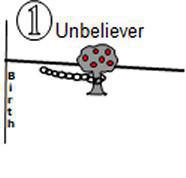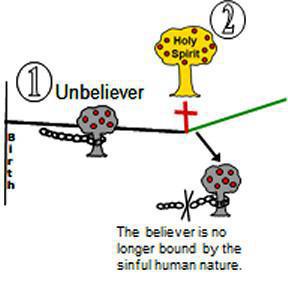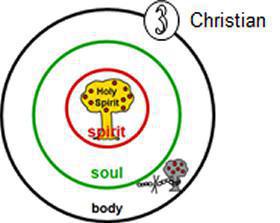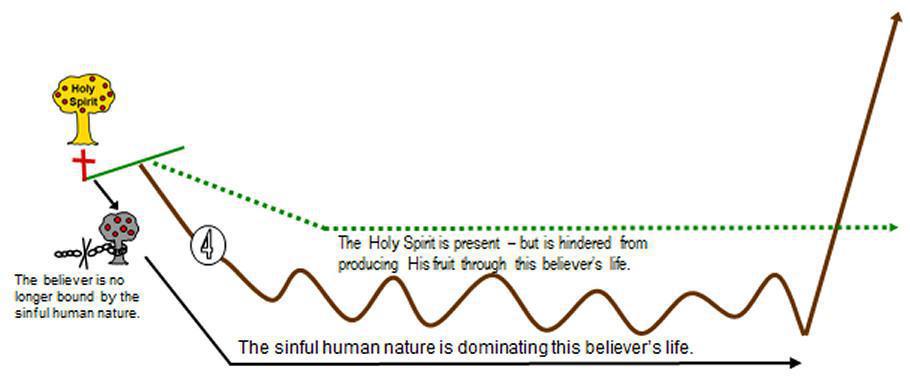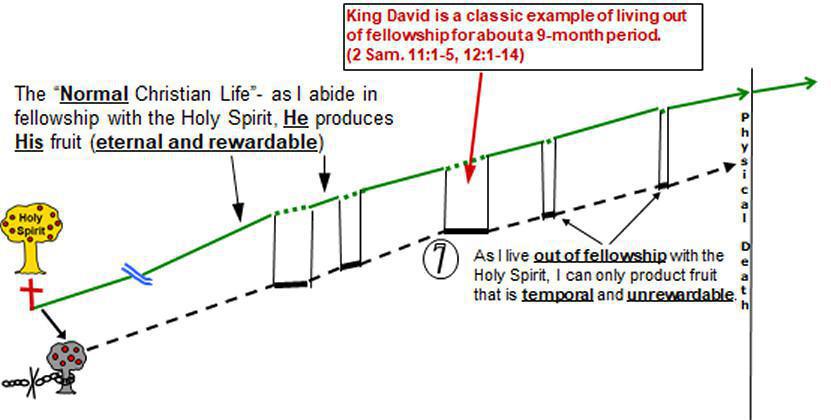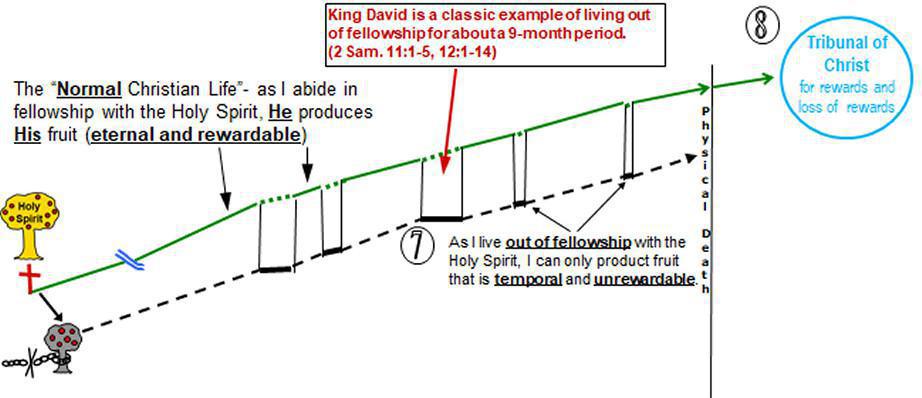This lesson reviews concepts previously covered to help me understand my continual interaction with my two competing natures, and the impact on my daily abiding relationship with the Lord. (Each individual component of the diagram will be explained in detail.)
After Salvation there are two paths for the believer to choose. (Note that BOTH of these paths represent believers.)
- One line gradually goes upward and into the "spiritual promised land." This upper path represents a believer who sees the Lord as his Master, that is, the One who oversees and manages his life.
- The lower path leads into a “spiritual desert.” This lower path represents the believer who, either out of ignorance or choice, has not acknowledged the Lordship of Christ over his life.
1) Before salvation, I was an unbeliever, bound to the sinful human nature (represented by the chain around the darkened tree).
At the cross I was delivered from the "penalty" of sin (represented by the “broken chain” around the darkened tree). During this life, from the cross until death, I am being delivered from the "power" of sin. And at physical death I will be delivered from the "presence" of sin.
2) At the moment of salvation, I was freed from the mastery of the sinful human nature, and received the Holy Spirit, Who dwells in the believer from that time forward. I started the Christian life abiding in fellowship with the Holy Spirit, and choose to take one of two paths: (#4 or #5/6)
It is important to note that while the believer has been set free from bondage to the sinful human nature, the sinful nature does not cease to exist and will continue in me until physical death occurs, at which time I will be freed from the presence of the sinful nature.
3) Upon believing, I was born into the spiritual race, and received God’s divine nature in the Person of the Holy Spirit. I am no longer bound to the sinful nature, although it is still present.
Romans 6:6-7 (Paul wrote) For we know that our old self was crucified with Him in order that sin’s dominion over the body may be abolished, so that we may no longer be enslaved to sin, since a person who has died is freed from sin’s claims.
The unbeliever has no option but to be mastered or dominated by the sinful nature, producing only flawed fruit. However, the believer is only dominated by the sinful nature by choice.
4) The lower wandering line represents the "abnormal" Christian life.
If not spiritually mentored and instructed on how to follow the Holy Spirit, many believers find themselves modeling their behavior after other believers, rather than following the leading of the Holy Spirit. The typical result is that the believer will at some point ignore or discount the leading of the Holy Spirit, choosing rather to follow the example of peers, falling into behavior manipulation instead of inward transformation.
As a result of spiritual ignorance, or by willful disobedience, if I am unwilling to allow the Holy Spirit to manage my life, I will find myself in a “desert” experience – never quite being able to gain victory over the pull of the sinful nature.
These believers typically see God as their "Junior Partner,” rather than their Master. They conclude that "He is always there when I can't cope and I determine I need Him to deliver me out of my current turmoil." They typically consider their own goals and aspirations to be of greater importance than those of God.
They desire for God to fit into their plans, rather than fitting into His plan. Their lives are characterized by a “disposition of self-dependence.” (As illustrated by King Saul – see Lesson 3-3)
Note that the Holy Spirit (His presence is represented by the dotted line just above the wavy line) is constantly wooing the believer to yield to Christ as Lord and Master. The Holy Spirit is not the dominant force in this believer’s life. As a consequence, this believer is not allowing the Holy Spirit the freedom to produce spiritual fruit in this believer’s life on a daily basis.
The solid line at the bottom represents the dominance of the sinful human nature. This believer typically relies on his own understanding to make decisions. By not allowing the Lord to rule in his life, the human nature is allowed to rule, always pulling him down, tempting him to sin, just like gravity is always pulling objects towards the earth, leading to physical consequences like falling. In the same way, sin influences all people, drawing them toward spiritually harmful choices.
Submission to the human nature will cause problems for the believer. Hopefully, he will become so dissatisfied and frustrated (usually through a crisis) that he will finally make a decision to acknowledge Christ's Lordship over His life.
These believers are described in the parable of The Sower (Luke 8:4-15) as seeds that fell among the thorns --distracted, not maturing, resulting in not bearing eternal rewardable fruit, until they choose to acknowledge His authority over their life, and begin to “abide.” Although saved, they can potentially lose all rewards.
1 Corinthians 3:15 If anyone’s work is burned up, it will be lost, but he will be saved; yet it will be like an escape through fire. (Full reference: 1 Corinthians 3:10-15)
To believers who have habitually lived in a desert experience, often for years, the thought of consistently abiding in fellowship with the Lord seems unrealistic and "super spiritual." Such a biblical relationship with the Lord is often perceived as idealistic and beyond the attainment of the average believer.
The simple truth is that it is not a matter of attaining to, but rather by faith taking advantage of what God has already made provision for.
If a believer simply understands the need to let the Lord manage his life (Lordship) and learns how to consistently abide in harmony, he will experience God's designed normal victorious Christian life.
2 Peter 1:3 His divine power has given us everything required for life and godliness through the knowledge of Him who called us by His own glory and goodness.
It's not something I "attain to." It is my [spiritual] birthright. Every Christian has a right to live in the spiritual Promised Land.
For many believers this desert experience could have been avoided, or significantly shortened, had they been personally mentored (“spiritually parented,” “personally discipled”) when they first accepted Christ as their Savior
5 & 6) The short parallel lines, located at the fork in the believer's life, represent the "spiritual Jordan River" and the believer's choice to acknowledge His Lordship and enter the "spiritual Promised Land." This indicates the “event” in the believer’s life to “choose” to let the Lord control and manage his life. (Joshua 3:12-17 recounts the story of the Israelites crossing the Jordan River.)
This is not a decision to “try my best,” or to “behave better in my own strength,” but rather a decision to surrender my “will,” accept His yoke, and allow Him to live His life through me.
Matthew 11:28-30 (Jesus said) Come to Me, all of you who are weary and burdened, and I will give you rest. All of you, take up My yoke and learn from Me, because I am gentle and humble in heart, and you will find rest for yourselves For My yoke is easy and My burden is light.
Galatians 2:20 (Paul wrote) … and I no longer live, but Christ lives in me. The life I now live in the body, I live by faith in the Son of God, who loved me and gave Himself for me.
Once the believer makes the Lordship decision, then the normal Christian life is one of consistently abiding in fellowship (harmony) with the Lord. The solid line at the top represents the time in which the believer is in fellowship with the Holy Spirit (“walking in the Spirit”).
The presence of the sinful nature in the spiritual believer is represented by a dashed line, always attempting to pull the believer into choosing sin.
7) Notice that there are breaks in the line, which represent periods of time during which the believer is out of fellowship (not abiding) with the Holy Spirit.
The third dip depicts the example of King David. (Click HERE to read this story in 2 Samuel)
When King David climbed up to the roof of his house, he may or may not have been in fellowship with the Lord. When he chose to commit adultery and murder, he was clearly out of fellowship. He remained out of fellowship with the Lord for approximately a nine-month period.
How did David express his feelings during the time he was out of fellowship with the Lord – and the remedy?
Psalm 32: 4-5 When I kept silent, my bones became brittle from my groaning all day long. For day and night Your hand was heavy on me; my strength was drained as in the summer's heat. Then I acknowledged my sin to you and did not conceal my iniquity. I said, "I will confess my transgressions to the Lord," and You took away the guilt of my sin.
Fellowship was not restored until just before the baby was born, when David was confronted by the prophet Nathan. As soon as David confessed his sin to the Lord he was immediately restored, even for murder and adultery. Yes, he suffered consequences through the rest of his life, but as far as God's forgiveness was concerned, he was immediately forgiven and restored into fellowship. Being restored into fellowship does not mean that there are no consequences, but it does mean that there is complete forgiveness.
As shown by David's story, the acceptance of Christ's Lordship over my life is no guarantee of continual unbroken spiritual fellowship.
Abiding fellowship is conditional. At any time I may allow my fellowship with the Holy Spirit to be disrupted, and find myself "walking in the flesh" (submitted to the sinful nature). At any given moment I am either submitted to the Holy Spirit or I am submitted to the sinful nature. I am either "walking in the Spirit" or "walking in the flesh."
God has made provision for every believer to consistently "walk in the Spirit" (the "normal" Christian life).
2 Peter 1:3-4 His divine power has given us everything required for life and godliness through the knowledge of Him who called us by His own glory and goodness. By these He has given us very great and precious promises, so that through them you may share in the divine nature, escaping the corruption that is in the world because of evil desires. [See also verses 5-11]
A believer may excuse sin using the pretext of "that's just the way I am," or cite verses from Romans 7, where Paul describes his struggle with the sinful nature. Note, however, that Paul's spiritual life was better characterized by Romans 8.
Certainly every believer will be out of fellowship with the Holy Spirit at times, but such periods should be the exception, not the rule. And those times of being out of fellowship (walking in the flesh, dominated by the sinful nature) should diminish in both frequency and duration as I mature.
The Holy Spirit will produce His fruit as I abide in Christ. My part is not to strive to produce fruit. Or worry about it. My part is to abide in fellowship with Him daily, and the fruit will come naturally. The Holy Spirit will only produce good fruit. I should not assume that everything I do while I am abiding is pleasing to God. He will only hold me accountable according to my maturity level, just as loving parents train their children.
Hebrews 12:10 For they disciplined us for a short time based on what seemed good to them, but He does it for our benefit, so that we can share His holiness.
During periods when I am out of fellowship (when I am not abiding) the Holy Spirit is not free to produce His fruit through my life.
John 6:63 The Spirit is the One who gives life. The flesh doesn’t help at all. The words that I have spoken to you are spirit and are life.
8) God wants to reward every believer. He is preparing eternal rewards that cannot be compared with the things of this world. Jesus commanded me to lay up treasure for myself in heaven, not here on earth. The treasures in heaven are so wonderful, they will make everything in this world that we're familiar with pale in comparison. I have to decide if I want to lay up eternal treasures in heaven or temporary treasures here on earth.
Matthew 6:20-21 (Jesus said) But collect for yourselves treasures in heaven... For where your treasure is, there your heart will be also.
1 Corinthians 3:10-15 speaks of potential "loss" at the Rewards Ceremony for believers. It is important to distinguish between "loss" and "punishment." Loss is not punishment. Consider a graduation ceremony as an example. You may go to a graduation where you receive a diploma. Others may receive accolades and awards in addition to their diploma. Because you only received a diploma it would not be correct to view yourself as being "punished." Those who have received special awards were honored because of their priority decisions. You could also have received special awards had you not chosen to forfeit them in favor of other priorities that you considered to be more important.
The believer who is walking in the flesh can do "good" things (from the human perspective), just as an unbeliever can. Anything, however small, that is motivated by the Holy Spirit is eternal and rewardable. Anything, regardless of outward appearance, that is not motivated by the Holy Spirit is flawed, less than perfect, and of no eternal or rewardable value.
1 Corinthians 13:1-3 (Paul warns us) If I speak human or angelic languages but do not have love, I am a sounding gong or a clanging cymbal. If I have the gift of prophecy and understand all mysteries and all knowledge, and if I have all faith so that I can move mountains but do not have love, I am nothing. And if I donate all my goods to feed the poor, and if I give my body in order to boast but do not have love, I gain nothing.
Only that which is produced by the Holy Spirit is perfect and can enter into eternity. Only the Holy Spirit can produce perfect fruit. It is not what I do "for" God that is important, but rather what I allow the Holy Spirit to produce through me.
Ecclesiastes 3:14 I know that all God does will last forever; there is no adding to it or taking from it. God works so that people will be in awe of Him.
The issue is not one of fruit or no fruit that I have to be concerned about. What I need to be concerned about is where does the fruit originate. As I abide in harmony with the Holy Spirit, He will bear His fruit through my life. It's as simple as that!
John 15:5 (Jesus said) “I am the vine, you are the branches. He who abides in Me, and I in him, bears much fruit; for without Me you can do nothing.” ( NKJV)


